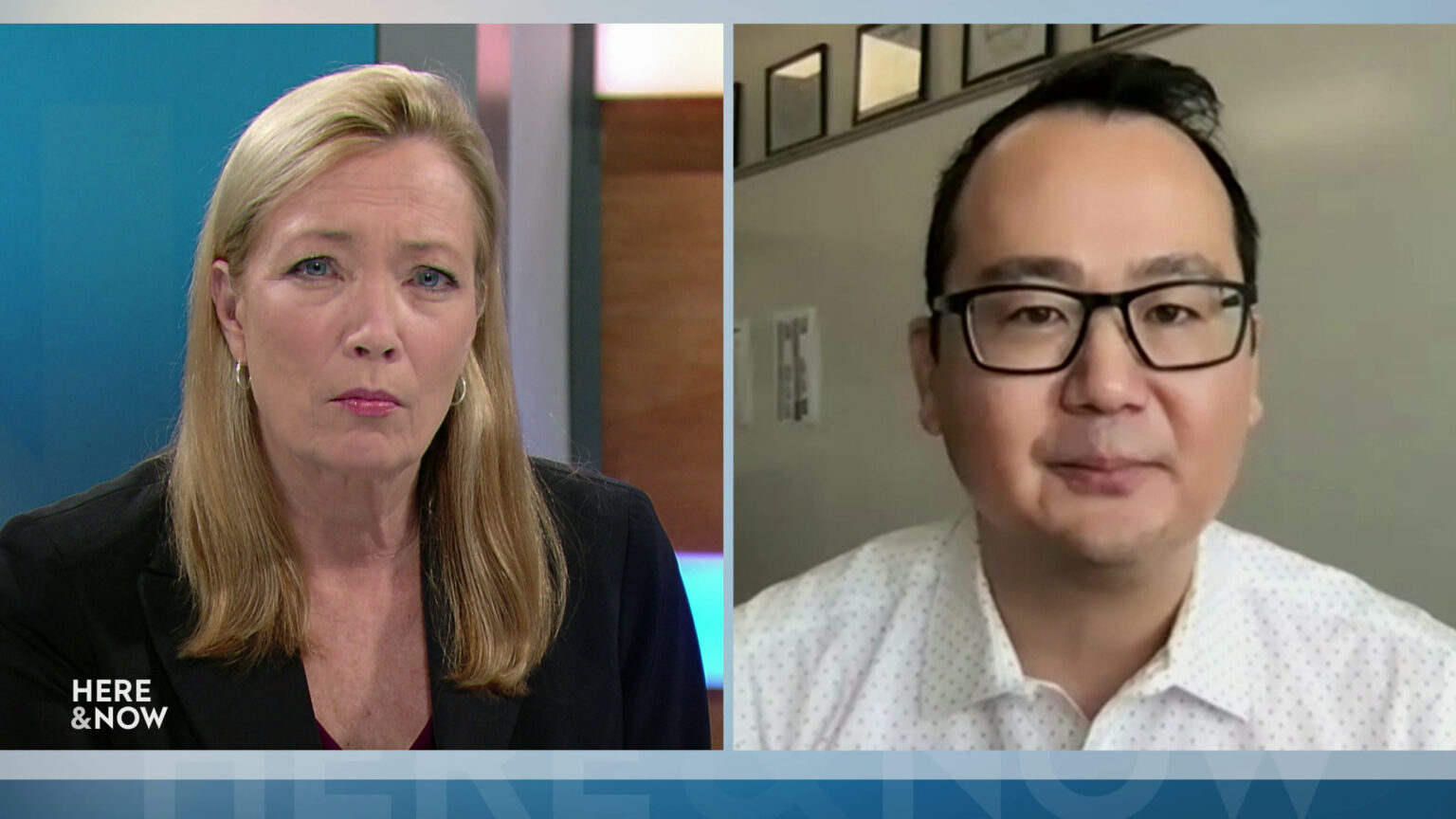'Here & Now' Highlights: Kabby Hong, Meagan Wolfe, Colin Gillis, Laura Dresser
Here's what guests on the Sept. 2, 2022 episode said about curriculum fights in schools, calls for more funding of the Wisconsin Elections Commission, why UW Health nurses are ready to strike and what the jobs outlook is for the state.
By Frederica Freyberg | Here & Now
September 6, 2022

Frederica Freyberg and Kabby Hong (Credit: PBS Wisconsin)
Local disputes over curriculum and what books K-12 students should or shouldn’t be assigned to read is a prominent election-year issue, and a Verona teacher representing the Asian American Pacific Islander Coalition of Wisconsin said denying history does students a disservice. The Wisconsin Elections Commission approved requesting $1.3 million for new staff and an Inspector General to manage a crush of records requests and citizen complaints — its administrator said the agency needs this money to provide the best information to the public. Hundreds of UW Health nurses in Madison are poised to go on strike over staffing shortages and work conditions, and one nurse explained why they want the hospital to recognize their union. A UW-Madison think tank released its annual report about the labor market in Wisconsin — its associate director said the group’s findings show mostly good news for workers.
Kabby Hong
Teacher, Verona Area High School and member of the Asian American Pacific Islander Coalition of Wisconsin
- While campaigning for governor in Wisconsin, Republican candidate Tim Michels said schools need to “stop the CRT and get back to the ABC’s.” With the removal of a book about the internment of Japanese Americans during World War II from curriculum in Muskego schools, Hong sees a connection between bans on teaching critical race theory and banning books in the classroom.
- Hong: “If you look at what people define as critical race theory, sometimes it’s a list of like 70 different terms, including terms like diversity. So really, these critical race theory bans have nothing to do with critical race theory, because, in K-12 education, critical race theory is really not taught. What the critical race theory bans really show is the discomfort that some people have with people of color with a truthful reflection about our nation’s history, with banning books, especially books written by authors of color.”
Meagan Wolfe
Administrator, Wisconsin Elections Commission
- The Wisconsin Elections Commission unanimously approved requesting $1.3 million to hire additional staff for an Elections Inspector General office. Its administrator said this funding is needed to assure public information about the election process in Wisconsin.
- Wolfe: “We’ve seen such a tremendous increase in people asking for additional information and the commission, even in their desire to increase things like the audits that our agency conducts. And so this proposal – and now with the commission’s unanimous approval – this proposal really places before lawmakers and the governor in the 2023 budget-making process a couple of questions. The first is, do they want to see an increase in the number of voting equipment audits that are conducted? Do they want to see an expansion in programs like our accessibility audits? And do they want the commission to engage in additional checks and reviews?”
Colin Gillis
Nurse, UW Health
- Hundreds of nurses at UW Health announced their intention to strike for three days starting Sept. 13. The nurses want hospital administration to recognize their union, SEIU Healthcare Wisconsin. Nurses complain of not enough staffing and the concerns that causes for patient care.
- Gillis: “I work on an inpatient unit where we take care of covid patients, among others, and we’re constantly working short staffed, and working short staffed as a nurse means that you’re just making an endless series of impossible decisions. Do I give this patient pain medications, or do I stay at the bedside and monitor this patient who may be decompensating and in danger of getting even sicker than they already are? It’s that kind of experience that causes burnout and exhaustion and moral injury that’s causing nurses to leave, not just bedside nursing like inpatient nursing, but to leave the profession in droves.”
Laura Dresser
Associate director, UW-Madison COWS
- COWS released the 2022 edition of its annual “The State of Working Wisconsin” report, and among its findings was the “great resignation” is a myth.
- Dresser: “I think people had a sense — those stories from about a year ago, I think gave people a sense that there were a lot of people who are like, take this job and I’m going to go live on the van life and develop an Instagram following group, or whatever. You know, that there was just a lot of retreat from work. But what there was actually and is clear in the data is that people really saw opportunity and they took it. They left jobs and they’ve moved up and they’ve moved on. But we have more people working in the state today than we did… the most that we’ve ever had, actually, people working in this state in May this year — well over 3 million. And we have a higher labor force participation rate today than we did [in] February 2020 coming into the pandemic.”
Watch new episodes of Here & Now at 7:30 p.m. on Fridays.
 Passport
Passport











Follow Us